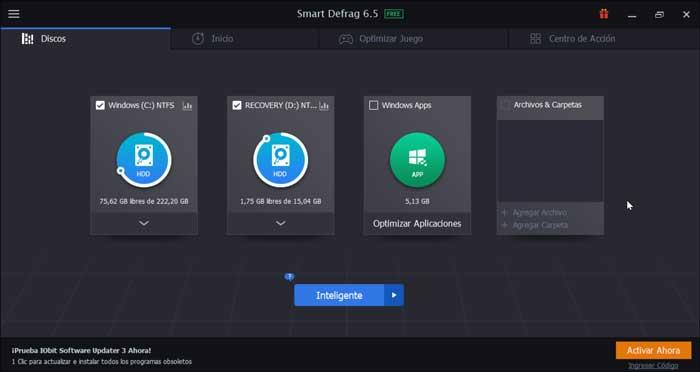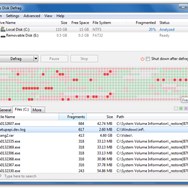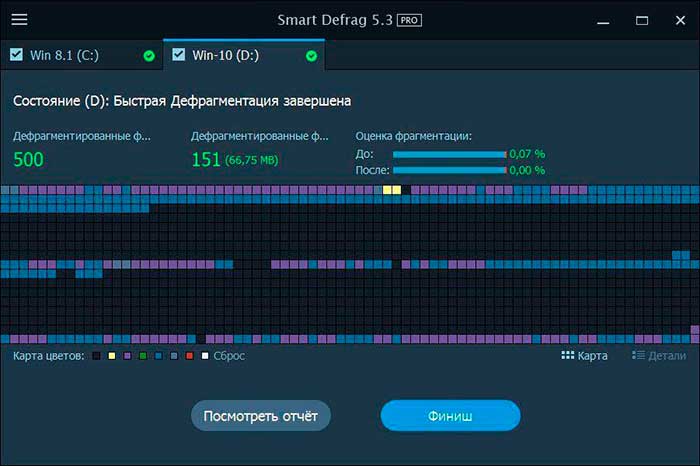

- #Perfectdisk vs iobit smart defrag manual
- #Perfectdisk vs iobit smart defrag portable
- #Perfectdisk vs iobit smart defrag software
What is that about anyway? (that there is a need to have free room is logical to me, but why put the percentage behind the number? To me the fact that 10 Gbyte of free space should be more than enough on a 500 Gbyte harddisk.but no, it has to be 50 Gbyte? What can be so big? Oh yeah.what I also like a lot from this is that it doesn't keep b.tching about lack of space on the harddisk/partition, while others start complaining that 10%-15% has to be free on the harddisk/partition before commencing or don't start at all before this 'requirement' is met. Since I tried this one, I dropped all the others. In my case the files I used most are put on the outer part, improving the access speed. partition depending on the setting that you prefer. What I like from this one is that it first defrags files and moves them afterwards to the inner or outer part of the harddisk c.q. the GUI is not one of the nicest.but I let it do its work at night when I go to sleep anyway. For anyone really gung-ho about a substitute for Vista's I'd probably suggest it there as well, or at least the Google searches for comparative research.The last freeware version from disktrix is what I use. On earlier versions of Windows I'd vote for Perfect Disk merely on the result of my past "x vs x", "x better than *", and "x compared to *" Google queries (try the wildcards). I have Win XP Home SP2, and for some reason PerfectDisc does no 'off-line' defrag on my computer Instead I have O&O Defrag v.8.5. (See the article for possible misconceptions.)īack to the original question: If you merely want to replace this scheduled task with a good defrag tool then my recommendation is for the Windows one already in use, at least on Vista. PerfectDisc has one function, that SmartDefrag has not: 'Off-Line Defrag' ( Defrag at Boot-time ), when system-locked files can be defragmented ( and the pagefile (s) ). I believe this is verifiable by simply running the utilities in question and noting that the reported fragmentation is within practical performance levels. (Although by all means if you wish to target highly specific performance sensitive problem files and directories with the likes of contig as mentioned you should do so.)
#Perfectdisk vs iobit smart defrag manual
The system scheduled idle defrag (find it in Task Scheduler->Microsoft->Windows->Defrag) is more than capable of keeping up with system fragmentation and a manual defrag has little benefit of significance.
#Perfectdisk vs iobit smart defrag software
I'm putting forward that a 3rd party defrag tool is entirely unnecessary. Compare price, features, and reviews of the software side-by-side to make the best choice for your business. The drive errors with chkdsk can be checked. It is also competent to run boot time defrags. The system files present in it can configure files to move faster and improves launch time also.
#Perfectdisk vs iobit smart defrag portable
The NTFS file system is quite an improvement over FAT32 in this regard, and this TechNet blog article discusses some of Vista's improvements in particular: Don’t judge a book by its cover – why Windows Vista Defrag is cool (nonpartisan I know ). Auslogics Disk Defrag Auslogics Disk Defrag is a powerful disk defragmenter tool that comes in the portable mode to scan removable media files.


The necessity of a good 3rd-party defrag tool isn't quite what it used to be, though they're of course still hotly peddled as cure-alls beside generic system cleaners.


 0 kommentar(er)
0 kommentar(er)
